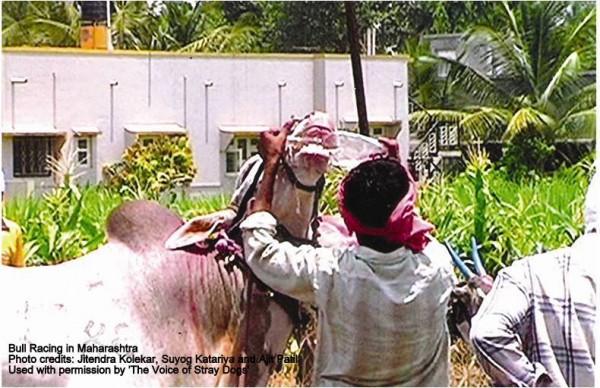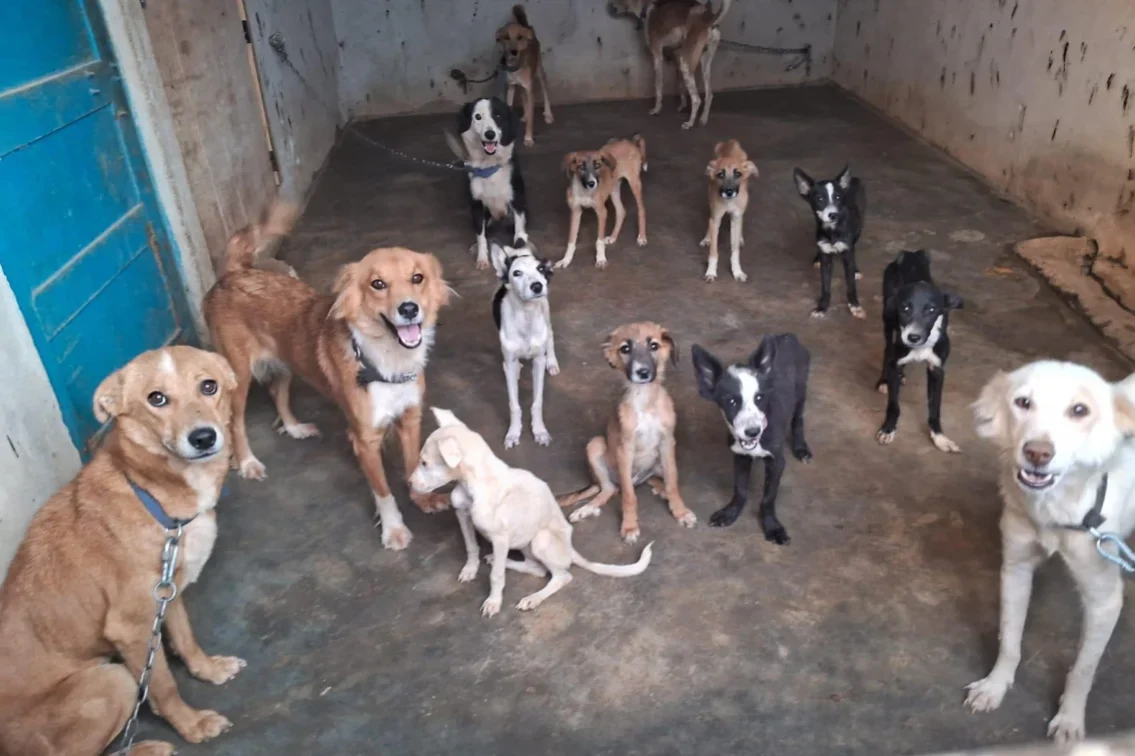“When we look at the rights of animals from the national and international perspective, what emerges is that every species has an inherent right to live and shall be protected by law, subject to the exception provided out of necessity. Animal has also honor and dignity which cannot be arbitrarily deprived of and its rights and privacy have to be respected and protected from unlawful attacks.” – Supreme Court of India, Jallikattu Judgment.
The Supreme Court of India passed a landmark judgement in the Jallikattu case, that has far reaching consequences for rights of animals in India. The entire text of the Supreme Court Jallikattu Judgement can be seen here, the scanned copy of the Supreme Court Jallikattu Judgment can be downloaded here pp 1- 20, pp 21-40, pp 41-60, pp 61-80, pp 81-100, pp 101-103.
In this part we see the excerpts of what the Supreme Court actually said & how you can use them to help animals.
SECTION I: INTRODUCTION
On the 7th of May, 2014, the Supreme Court of India pronounced what can only be termed a historic judgment in the matter titled “Animal Welfare Board of India Versus A. Nagaraja & Others” and several related appeals and petitions. It is common knowledge that vide its judgment, the Hon’ble Court banned the use of bulls and bullocks in performances such as jallikattu and bullock cart races.
WHAT IS NOT COMMON KNOWLEDGE, YET, however, is just how elaborately the Hon’ble Court dealt with the issue of Animal Rights, and “ordered” protection for animals.
In section II of this article, below, we have excerpted some “QUOTABLE QUOTES” from the judgment. They’re exceptional, they’re immensely empowering; and THIS IS THE SUPREME COURT OF INDIA, TALKING.
“Arm” yourselves with these; and use the Supreme Court observations
- in any litigation involving animals that you may be involved in, or
- any police case or complaint, or
- any other hostile or dispute situation that you may find yourself in, on account of the non-humans that you care for and wish to protect,
Or use the excerpts that you find in Section II of this article, as the situation demands.
In fact, especially when confronted with unsympathetic and unrelenting ‘public authorities’, including Courts and police establishments or police personnel, knowing what the Supreme Court has said, and inviting their attention to it, might just “tilt the balance” in your favor.
SECTION II: WHAT THE SUPREME COURT SAID – EXCERPTS
- The Supreme Court of India pitched strongly for Animal Rights, and declared that the rights of animals are an ‘issue of seminal importance’, at Para 2 of the judgment, set out below:
“We are, in these cases, concerned with an issue of seminal importance with regard to the Rights of Animals under our Constitution, laws, culture, tradition, religion and ethology, …….”
- The Supreme Court of India on fundamental rights for animals, stated, at para 56 of the judgment:
“56. Rights guaranteed to the animals under Sections 3, 11, etc. are only statutory rights. The same have to be elevated to the status of fundamental rights, as has been done by few countries around the world, so as to secure their honor and dignity. Rights and freedoms guaranteed to the animals under Sections 3 and 11 have to be read along with Article 51A(g)(h) of the Constitution, which is the magna carta of animal rights.”
- The Supreme Court of India on the five internationally recognized freedoms for animals, stated, at para 54 of the judgment:
“……
(i) freedom from hunger, thirst and malnutrition;
(ii) freedom from fear and distress;
(iii) freedom from physical and thermal discomfort;
(iv) freedom from pain, injury and disease; and
(v) freedom to express normal patterns of behaviour.
“These five freedoms, as already indicated, are considered to be the fundamental principles of animal welfare and we can say that these freedoms find a place in Sections 3 and 11 of PCA Act and they are for animals like the rights guaranteed to the citizens of this country under Part III of the Constitution of India.”
NOTE : In effect, the Supreme Court has said that this is what has to be ensured for all animals in the country.
- The Supreme Court of India on the duties of persons having charge of animals (in the context of Section 3 of the Prevention of Cruelty to Animals Act), we are excerpting some affirmations that the Court made at Para 27 of the judgment:
“Section 3 of the Act deals with duties of persons having charge of animals, which is mandatory in nature and hence confer corresponding rights on animals. Rights so conferred on animals are thus the antithesis of a duty and if those rights are violated, law will enforce those rights with legal sanction.
“Primary duty on the persons-in-charge or care of the animal is to ensure the well-being of the animal. ‘Well-being’ means state of being comfortable, healthy or happy.
“Organizers of Jallikattu are depriving the rights guaranteed to the bulls under Section 3 of PCA Act. Sadism and perversity is writ large in the actions of the organizers of Jallikattu and the event is meant not for the well-being of the animal, but for the pleasure and enjoyment of human beings, particularly the organizers and spectators. Organizers of Jallikattu feel that their bulls have only instrumental value to them, forgetting their intrinsic worth.”
- The Supreme Court of India on ‘Culture and Tradition’: In the context of arguments by the State of Tamil Nadu and the Government of India that it is a part of our culture and tradition to deal with animals in a certain manner, the Supreme Court disagreed, and countered with excerpts from the Isha Upanishads at Paras 44 and 45 of the judgment, and also said at Para 43, as under:
“44. As early as 1500-600 BC in Isha-Upanishads, it is professed as follows:
“The universe along with its creatures belongs to the land. No creature is superior to any other. Human beings should not be above nature. Let no one species encroach over the rights and privileges of other species.”
“45. In our view, this is the culture and tradition of the country, particularly the States of Tamil Nadu and Maharashtra.
NOTE : This can be used to effectively quell any ‘culture and tradition’ argument used for mistreating animals in any manner within this country (unless, of course, any aspect of culture, tradition, and manner of treatment, are codified in and incorporated into any law prevailing in the country).
“43. PCA Act, a welfare legislation, in our view, over-shadows or overrides the so-called tradition and culture. Jallikattu and Bullock cart races, the manner in which they are conducted, have no support of Tamil tradition or culture. Assuming, it has been in vogue for quite some time, in our view, the same should give way to the welfare legislation, like the PCA Act which has been enacted to prevent infliction of unnecessary pain or suffering on animals and confer duties and obligations on persons in-charge of animals.”
- The Supreme Court of India on the ‘right to life’ of all species, and ‘rights’ conferred on animals by law – we are excerpting the Court’s affirmations point-wise, from Para 62 of the judgment:
“…
(i) Every species has a right to life and security, subject to the law of the land, which includes depriving its life, out of human necessity.
(ii) So far as animals are concerned, in our view, “life” means something more than mere survival or existence or instrumental value for human-beings, but to lead a life with some intrinsic worth, honour and dignity.
(iii) Animals’ well-being and welfare have been statutorily recognised under Sections 3 and 11 of the Act and the rights framed under the Act. Right to live in a healthy and clean atmosphere and right to get protection from human beings against inflicting unnecessary pain or suffering is a right guaranteed to the animals under Sections 3 and 11 of the PCA Act read with Article 51A(g) of the Constitution.
(iv) Right to get food, shelter is also a guaranteed right under Sections 3 and 11 of the PCA Act and the Rules framed thereunder, especially when they are domesticated.
(v) Right to dignity and fair treatment is, therefore, not confined to human beings alone, but to animals as well.
(vi) Right, not to be beaten, kicked, over-ridden, over-loading is also a right recognized by Section 11 read with Section 3 of the PCA Act.
(vii) Animals have also a right against the human beings not to be tortured and against infliction of unnecessary pain or suffering.
(viii) Penalty for violation of those rights are insignificant, since laws are made by humans.
(ix) Punishment prescribed in Section 11(1) is not commensurate with the gravity of the offence, hence being violated with impunity defeating the very object and purpose of the Act, hence the necessity of taking disciplinary action against those officers who fail to discharge their duties to safeguard the statutory rights of animals under the PCA Act.”
NOTE : The Hon’ble Court has very categorically declared that all of the above are rights conferred on animals by law, which all persons, including care-givers of course, have a corresponding duty to ensure for them.
- The Supreme Court of India on the inherent dignity and right to live peacefully, of all living creatures:
Para 32
“All living creatures have inherent dignity and a right to live peacefully and right to protect their well-being which encompasses protection from beating, kicking, over-driving, over-loading, tortures, pain and suffering etc.”
Para 51
“When we look at the rights of animals from the national and international perspective, what emerges is that every species has an inherent right to live and shall be protected by law, subject to the exception provided out of necessity. Animal has also honor and dignity which cannot be arbitrarily deprived of and its rights and privacy have to be respected and protected from unlawful attacks.”
- The Supreme Court of India on the significance to be accorded by Courts, to ‘welfare legislation’ such as the Prevention of Cruelty to Animals Act (negligible penalties specified for offences notwithstanding), we are excerpting some affirmations that the Court made at Para 26 of the judgment:
“PCA Act is a welfare legislation which has to be construed bearing in mind the purpose and object of the Act and the Directive Principles of State Policy. It is trite law that, in the matters of welfare legislation, the provisions of law should be liberally construed in favour of the weak and infirm.
“Court also should be vigilant to see that benefits conferred by such remedial and welfare legislation are not defeated by subtle devices.
“Court has got the duty that, in every case, where ingenuity is expanded to avoid welfare legislations, to get behind the smoke-screen and discover the true state of affairs.
“Court can go behind the form and see the substance of the device for which it has to pierce the veil and examine whether the guidelines or the regulations are framed so as to achieve some other purpose than the welfare of the animals. Regulations or guidelines, whether statutory or otherwise, if they purport to dilute or defeat the welfare legislation and the constitutional principles, Court should not hesitate to strike them down so as to achieve the ultimate object and purpose of the welfare legislation.
“Court has also a duty under the doctrine of parents patriae to take care of the rights of animals, since they are unable to take care of themselves as against human beings.”
- THE SUPREME COURT OF INDIA, ON SPECIESISM:
“59. Speciesism as a concept coined by Richard Ryder in his various works on the attitude to animals, like Animal Revolution, Changing Attitudes towards Speciesism (Oxford: Basil Blackwell, 1989), Animal Welfare and the Environment (London: Gerald Duckworth, 1992) etc. Oxford English Dictionary defines the term as “the assumption of human superiority over other creatures, leading to the exploitation of animals”. Speciesism is also described as the widespread discrimination that is practised by man against the other species, that is a prejudice or attitude of bias towards the interest of members of one’s own species and against those of members of other species. Speciesism as a concept used to be compared with Racism and Sexism on the ground that all those refer to discrimination that tend to promote or encourage domination and exploitation of members of one group by another. One school of thought is that Castism, Racism and Sexism are biological classification, since they are concerned with physical characteristics, such as, discrimination on the ground of caste, creed, religion, colour of the skin, reproductive role etc. rather than with physical properties, such as the capacity for being harmed or benefited.
“60. We have got over those inequalities like Castism, Racism, Sexism etc. through Constitutional and Statutory amendments, like Articles 14 to 17, 19, 29 and so on. So far as animals are concerned, Section 3 of the Act confers right on animals so also rights under Section 11 not to be subjected to cruelty. When such statutory rights have been conferred on animals, we can always judge as to whether they are being exploited by human-beings. ……”
- THE SUPREME COURT OF INDIA, ON WHY THE INTERNATIONAL COMMUNITY SHOULD HANG ITS HEAD IN SHAME:
“47. We may, at the outset, indicate unfortunately, there is no international agreement that ensures the welfare and protection of animals. United Nations, all these years, safeguarded only the rights of human beings, not the rights of other species like animals, ignoring the fact that many of them, including Bulls, are sacrificing their lives to alleviate human suffering, combating diseases and as food for human consumption. International community should hang their head in shame, for not recognizing their rights all these ages, a species which served the humanity from the time of Adam and Eve. ……”
The entire text of the Supreme Court Jallikattu Judgement can be seen here, the scanned copy of the Supreme Court Jallikattu Judgment can be downloaded here pp 1- 20, pp 21-40, pp 41-60, pp 61-80, pp 81-100, pp 101-103.
Tags : analysis on VoSD, Jallikattu Judgement, Supreme Court of India






